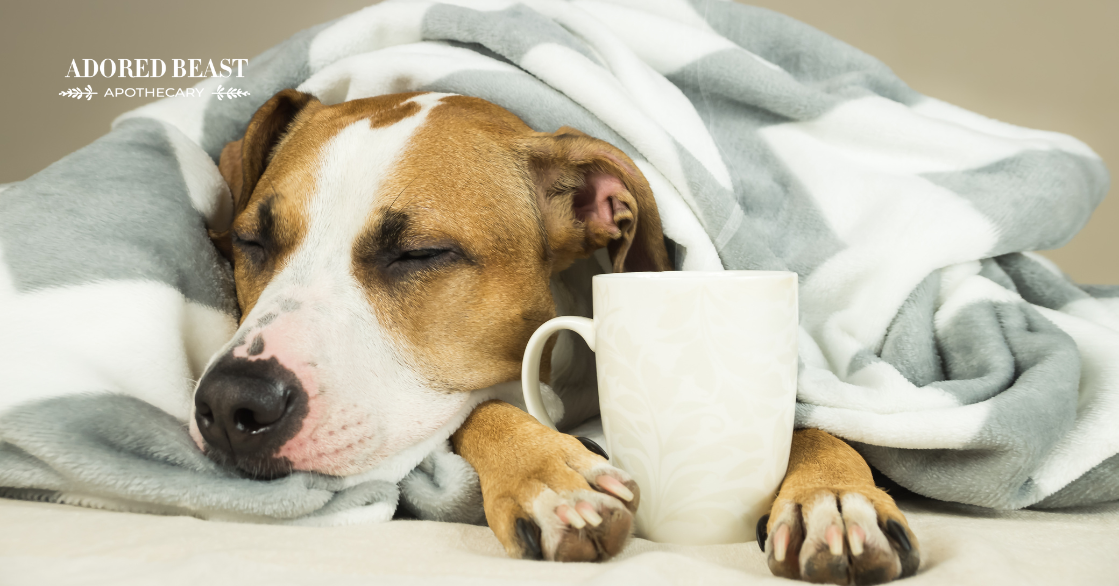In the morning, in the afternoon, in the evening… In our opinion, there’s never a bad time to have tea. The kettle in the ABA office kitchen is boiling water pretty much all day long. Everyone has their favourite, be it chamomile, chai, peppermint, or orange pekoe.
While you’re waiting for your kettle to boil, have you ever considered tea for dogs? Have you ever thought about whether or not those benefits you get from tea are also ones your canine companions could take advantage of?
Several of the herbal teas that we brew for ourselves can also positively impact the health of our pups in the same way that it does ours! That’s great news.
This week, we’re talking tea for dogs.
Tea for Dogs
Let’s start with this: caffeine is a no-go for dogs, so we always suggest reaching for decaffeinated tea when it comes to tea for dogs. If your dog has a small lick of your tea from your mug, don’t fret – all will be well. That said, we don’t recommend using any tea with caffeine for our adored beast. Stick to herbal and decaffeinated.
Ok, decaf, got it.
Now why would we brew a mug for our dogs?
Different teas contain various beneficial properties that, as mentioned, are just as healthy for our dogs as they are for us, including:
- antioxidant
- antimicrobial
- anti-inflammatory
- antiviral
Our Top Choices
Many of these teas have both internal and external benefits! (We’ve noted beside each one how you can use it.)
When using externally, brew a pot of your chosen tea and let it cool. Soak a cotton cloth or piece of gauze and hold it to the area that needs attention. Because these are all safe for dogs, there’s no concern if your pet licks it off – but try to let it soak into he skin to work its magic.
When giving internally, start slow and work your way up to the suggested amount. Add the recommended dose to your dog’s dinner or give in a small cup with water. You can even add tea bags to your bone broth when you’re making it. We don’t recommend adding it to the water bowl as you always want fresh water available. This is especially true in cases where your dog is not a fan of the taste of the tea! As with any herb, don’t use long-term.
1. Chamomile Tea
Chamomile tea is an easy way to help calm your pup when she is stressed or anxious. It can also be helpful for an upset stomach, vomiting, and indigestion. Externally, chamomile soothes, calms, and it also has antimicrobial properties that can help with itching, skin rashes, and inflammation. It can also speed up the healing process of a wound. It can even take down swelling and inflammation of the skin around the eye, as well as treat infection in the eye.
Uses: Internal and External.
Amounts per day: 1-2 teaspoons for small dogs, 1-2 tablespoons for large dogs.
2. Green Tea
Green tea is antioxidant rich, which means it helps to fight free radicals. It also contains antioxidant polyphenols that have anti-inflammatory and anti-cancer properties. It’s also an excellent source of vitamins A, D, E, C, B, B5, H, and K, manganese and other beneficial minerals such as zinc, chromium, and selenium. Green tea can help support the immune system, the liver, the brain, and the heart. Externally, it can be soothing for hot spots or to wipe out dirty ears.
Uses: Internal and External.
Amounts per day: 1-2 tablespoons for small dogs, 1/8 cup for medium dogs, 1/4 cup for large dogs.
Note: regular green tea does contain caffeine, so always look for decaffeinated. And make sure the caffeine is extracted using water.
3. Ginger Tea
Ginger is excellent for soothing nausea, vomiting and other tummy troubles. Ginger tea contains antioxidants, it works as a natural anti-inflammatory, and it stimulates the circulatory system. **Avoid giving ginger to dogs with bleeding disorders, dogs having surgery soon, and dogs taking Non-Steroidal Anti-Inflammatory Drugs (NSAIDs), because ginger acts as a blood thinner. Also, ginger can be too hot/spicy for dogs that pant a lot or run hot. When you make this blend, dilute it – do not make it strong!
Uses: Internal.
Amounts per day: less than 1/8 cup for small dogs, 1/8 – 1/4 cup for medium dogs, up to 1/2 cup for large dogs.
4. Echinacea Tea
Echinacea is best known for its immune-boosting power, which comes from various constituents in the plant. All these constituents work synergistically to help enhance immunity and support disease resistance in the body. It can help fight against various infectious diseases, as well as for respiratory ailments and skin infections, and also has anti-inflammatory and antimicrobial properties. ***Avoid echinacea tea internally for dogs with auto-immune disorders as it stimulates the immune system.
Uses: Internal and External.
Amounts per day: 1-2 teaspoons for small dogs, 1-2 tablespoons for large dogs.
There are many reasons to consider tea for dogs when it comes to natural health and health. Brewing up a cup for your pup may be just the thing to help!












